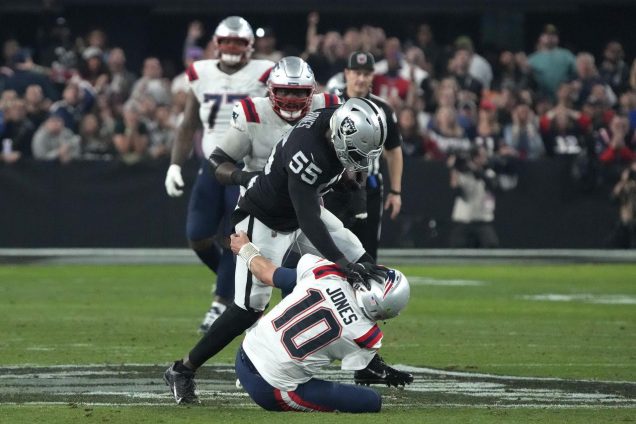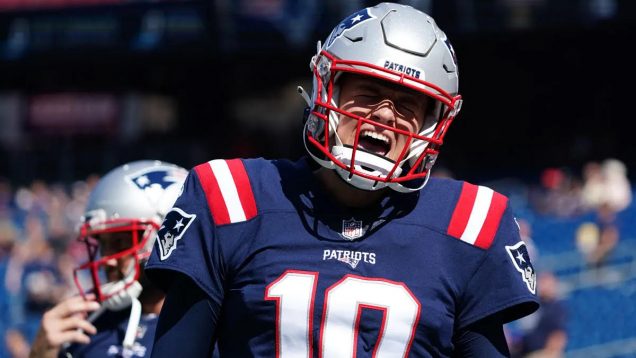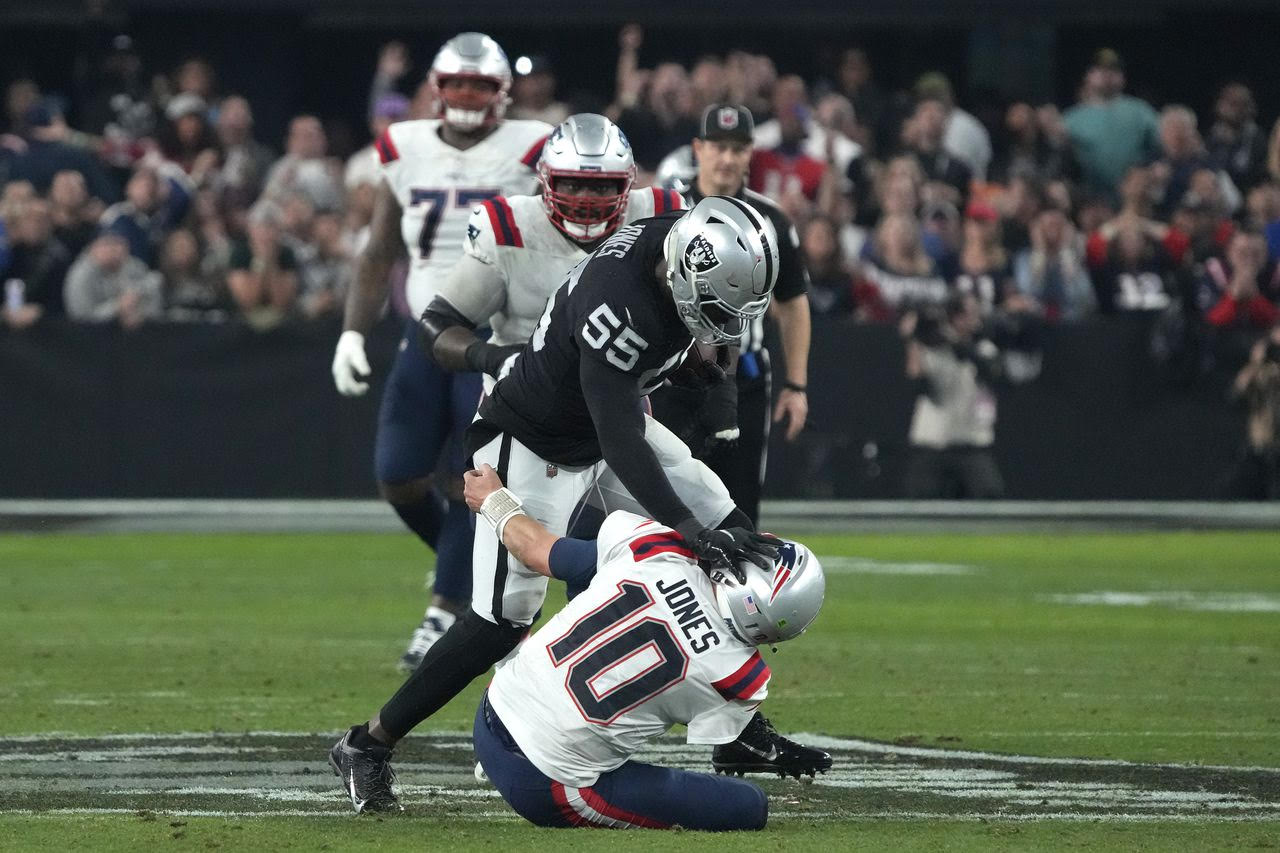The B-Gap: Bill Belichick can’t do it all by himself
By Sam Robb O’Hagan
If this was the end, it was perfectly appropriate.
The New England Patriots, now 7-7 on the season, are officially on the outside of the playoffs looking in after a devastating and equally uncomfortable loss at the Las Vegas Raiders.
Last Friday, the Patriots had a 46% chance to make the playoffs, according to FiveThirtyEight’s playoff forecast. On Monday morning, it was 19%.
The decisive moment the fortunes of a turbulent season shifted is obvious; you’ve almost certainly already seen it on social media — and probably more than once — as it is one of the most surreal finishes to a game the NFL has seen in the near-century it’s been playing football games.
There are three seconds left. The Patriots have the ball at their own 45. It’s 24-24.
Of course, New England wants to throw a hail mary but can’t, because as head coach Bill Belichick pointed out after the game, quarterback Mac Jones “couldn’t throw it that far.”
What followed — a draw to running back Rhamondre Stevenson, then a curious lateral to wide receiver to Jakobi Meyers, then an unnecessary and mindless chuck back to Jones — the Raiders’ Chandler Jones — was unthinkable.
Unthinkable not because it was the wildest possible finish to an already ridiculous game, but because all of it — the chaos, the embarrassment, the choke — involved a team coached by Belichick.
‘Do Your Job.’ That has always been Belichick’s calling card, for the 22 years he’s coached the Patriots and the six Super Bowls he’s won.
Well, on Sunday, on the last play of regulation in a critical late-season matchup with huge playoff implications, the ball was in the hands of Belichick’s best job-doers.
Stevenson has turned into a wonderful second-year runner of whom the Patriots’ somewhat palatable rushing attack has come to rely on. Meyers is the typical Belichick-guided success story: An undrafted and under-appreciated skill position player whose character is universally admired by just about everyone lucky enough to cross his path. That attitude has allowed him to become far-and-away the most reliable option on a meager aerial offense.
The devastating mistakes of each, first Stevenson’s head-scratching and needless lateral, then Meyer’s glaringly unnecessary attempt at getting the ball back to his quarterback, were the unfortunate culmination of a season marred by a systemic offensive failure.
And there Chandler Jones was, somehow with the ball in his hands after trailing 20 yards behind it just seconds earlier, stuffing Mac Jones and the Patriots six feet under the field at Allegiant Stadium on his way to an incomprehensible last second win.

And it was perfectly appropriate. This Patriots’ season, about to become the second of the last 14 to end before the playoffs, has been defined by that systemic offensive failure.
The Patriots’ offense is 10th-worst in passing yards, eighth-worst in total yards and total offensive DVOA, sixth-worst in turnovers, fifth-worst in first downs, and fourth-worst in third-down conversion percentage and fourth-down conversion percentage.
Their most dangerous card — that rushing attack led by Stevenson — is still below average in both yards per game and yards per attempt.
But it’s about more than just the measly production. The discipline, the cohesion and the consistent ability to ‘Do Your Job’ required of every successful coalition in the NFL — and the superpower of New England offenses of the past — has eluded the Patriots all season.
First the lack of discipline; New England has committed the 10th-most offensive penalties — 86 total worth 700 yards — after committing the eighth-fewest in 2021. And in the seven seasons prior, the Patriots finished in the bottom-10 in each, the most penalty-heavy of which was all the way back in 2015.
As for the cohesion, just reading the body language of Jones tells the entire story. In their Week 13 loss against the Bills, he was caught yelling “throw the f—ing ball” on the sideline, presumably in the direction of a member of the offensive coaching staff, before vehemently observing that the “f—ing quick (passing) game sucks.”
Two weeks later, following an end-zone incompletion on 3rd-and-goal early in the second quarter against the Raiders, there Jones was, failing to contain his frustration with Stevenson, who — speaking of ‘Doing Your Job’ — had ran the wrong route out of the backfield.
Should the Patriots fail to make up the ground in a hotly contested AFC Wild Card race, it’s only right that this miserable offense was at the center of the failure that everyone will remember, the moment that sunk the team’s season once and for all.
And this isn’t about the absence of the legendary Tom Brady, the greatest job-doer of them all, who quarterbacked the Patriots with instrumental precision on their way to those six Super Bowl titles. It cannot be about him, who, by the way, was in the middle of turning the ball over four times in a second half collapse in Tampa as the Patriots were throwing their season away (literally).
Instead, it has to be about the absence of the head coach on the opposite sideline in Las Vegas and on the victorious side of the chaos: former Patriots’ offensive coordinator Josh McDaniels. In his 12 seasons in New England, the chaos always followed him, whether it be his riffs with Belichick’s stone-cold operation or his bizarre attempt at escaping it to become head coach of the Indianapolis Colts in 2020.
14 games after McDaniels’ eventual departure, the chaos is following Belichick. Each of his two most trusted offensive players let him down in his team’s biggest moment. His second-year quarterback has spent the last three weeks yelling at, well, everyone, clearly longing for McDaniels’ evident genius that had helped him on his way to one of the better rookie seasons from a passer in decades.
So in that sense, not only was it perfectly appropriate for the Patriots’ season to be buried in part by an unbelievable offensive blunder, but also in part by these Raiders, coached by McDaniels — the play-calling lifeline of the Patriots’ past whose absence Belichick and friends are now being forced to appreciate.

And make no mistake, Belichick and friends is by no means a figure of speech. Very few members of this offense have been immune to Jones’ apprehensible outbursts, but the man in the most direct line of fire is unquestionably senior football advisor and offensive line coach Matt Patricia.
Patricia, in his first season as the unofficial leader of the Patriots offense — or any offense, for that matter — became one of Belichick’s most trusted assistants in his five years as the Patriots’ defensive coordinator between 2012 and 2017.
His friendship with Belichick became a sort of get-out-of-jail-free card. Despite his abominable failure in his three seasons as head coach of the Detroit Lions starting in 2018, or his 16 years removed from any offensive coaching role in professional football, Belichick was ready to shoe-horn his old friend into the void that McDaniels had left, as if it all really was that easy.
The rest of Belichick’s committee of offensive coaches includes offensive assistant and quarterbacks coach Joe Judge, who’s coaching career before this season had been spent almost entirely on special teams, save for two miserable years as head coach of the New York Giants before the 2022 season.
But like Patricia, Judge had developed an unbreakable rapport with Belichick in the eight seasons he spent in New England, so there was a role on the Patriots offense for him, too.
It’s all gone about as well as you might expect.
The ubiquitous failure from the Patriots offense in 2022 is the culmination of a series of dumbfounding and arrogant coaching staff decisions from Belichick after McDaniels’ departure, all for which he was afforded the benefit of the doubt he’s earned over his two decades in Foxboro.
This isn’t to say that Belichick didn’t earn that benefit — after all, as soon as he places both his hands on the table, wearing those six Super Bowl rings, there isn’t much that anyone can say.
And no, Belichick isn’t “washed.” In regards to his ability as a defensive coach, he is still who he always was: An undeniable genius with an uncanny ability to turn cheap, largely written-off role players into ultra-productive contributors for frustratingly savvy units.
In regards to his ability as an offensive coach, he is also what he probably always was — largely out of his realm of expertise and reliant on the excellent work of others to pick up the slack. The only difference in 2022? No longer does he have Brady, who will likely be as close to a ‘coach on the field’ as any player we’ll ever see; or McDaniels, one of the most consistently coveted offensive minds in the league, to cover up the glaring (and perfectly acceptable) void in his capabilities.
After losing the two critical pillars to his offense in the space of two seasons — each of whom, by the way, aren’t exactly lighting up the league outside of New England this season — Belichick filled the void with two trusted old friends, two extensions of himself, and it all blew up in his face.
In a way, the failure that the 2022 Patriots are now almost destined to become is still filled with a tangible sense of opportunity. The manner in which it has all unraveled doesn’t serve as a call for Belichick to retire through a bright warning sign that his abilities are waning.
This season’s tribulations write more like a humbling reminder to the league’s most justifiably confident coach that he can’t do it all by himself, that his unforeseen powers may only be limited to one side of the ball. How Belichick handles that revelation — whether he stays firm with Judge and Patricia in the face of their (and really his) obvious deficiencies, or curbs his ego to allow for more inventive and qualified offensive ideas — will define the next steps of his legendary career.
After all, a confident Bill Belichick is one thing. A humbled Bill Belichick? That could be a totally different monster.
